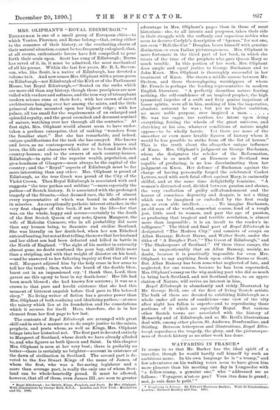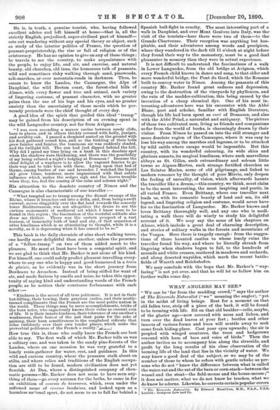WAYFARING IN FRANCE.*
IT seems to us that Mr. Barker has the ideal spirit of a traveller, though he would hardly call himself by such an ambitious name. In his own language he is " a tramp," and few adventures on his walking tours seem to have given him more pleasure than his meeting one day in Languedoc with " a fellow-tramp, a genuine one," who " addressed me as follows : Voyageur, n'est-ce pas ? Vous cites dans le grand ; moi, je suis dans le petit.' " • Wayfaring in France. By Edward Harrison Barker. With 50 illustrations. London Richard Bentley and Son. 1890. He is, in truth, a genuine tourist, who, having followed excellent advice and left himself at home—that is, all the strictly English, prejudiced, super-civilised part of himself—
sets out wandering without any special theory or object, such as study of the interior politics of France, the question of peasant-proprietorship, the rise or fall of religion or of the aristocracy. He has no opinion to give on any of these things ; he travels to see the country, to make acquaintance with the people, to enjoy life, and air, and exercise, and natural beauty, old churches, old inns, the humorous talk of peasants, wild and sometimes risky walking through sand, pinewoods, salt-marshes, or over mountain-roads in darkness. Thus, he comes to know the Landes, the Camargue, the Alps of Dauphine, the wild Breton coast, the forest-clad hills of Alsace, with every flower and tree and animal, each variety of lingering costume, of peasant character, with no greater pains than the use of his legs and his eyes, and no greater anxiety than the uncertainty of those meals which he per- versely pretends were the chief thought of every day.
A good idea of the spirit that guided this ideal " tramp " may be gained from his description of an evening spent in the wild Languedoc country, not far from Avignon :—
"I was soon ascending a narrow ravine between sandy cliffs, bare in places, and in others thickly covered with holly, juniper, and scrubby oak. I passed a shepherd seated on the ground with his flock gathered round him, and as the tinkling of their bells grew fainter and fainter, the luminous air was suddenly shaded, and the twilight fell. The sun had just dipped behind the hill. Why did I spend my time lying on a bank in this desolate spot when the shadows were thickening, and there was the possibility of my being refused a night's lodging at Domazan ? Because the chief delight of a wayfarer is to allow the vagrant fancies to go their way and to take him with them. Lying upon that bed of thyme, among bushes of rue and lavender, I watched the liquid sky grow bluer, tenderer, more impassioned with that subtle influence which makes the sedges sigh and the leaves tremble when they, too, feel the coming of the calm and solemn night."
His attraction to the desolate country of Nimes and the Camargue is also characteristic of our traveller :-
" What tempted me to tramp among the dismal swamps of the Rhine, where it branches out into a delta, and, from being a swift current, moves sluggishly over the flat land towards the scarcely lower Mediterranean, was not altogether the desire to see the curious monuments of mediaeval art which I knew were to be found in this region ; the fascination of the wasteful solitude also drew me thither. There was the certain prospect of a vast horizon, of immensity both of land and sky, of that sensation of utter loneliness which is as stimulating to thought„while it is a novelty, as it is depressing when it has ceased to be so."
This book is the daily chronicle of nine short walking tours, one hardly more delightful than another, unless the presence of a " fellow-tramp " on two of them added much to the pleasure. He must at least have been a congenial spirit, and we are glad to think that Mr. Barker is not alone of his kind.
For himself, one could safely predict pleasant travelling every- where to any one who is happy and good-humoured in a train de plaisir, as he evidently was in the short journey from Bordeaux to Arcachon. Instead of being stifled for want of air, and made furious by smells and noise, he takes this oppor- tunity of saying kind and understanding words of the French people, as he notices their courteous forbearance with each other :—
"Kindness is the secret of all true politeness. It is not in their hat-lifting, their bowing, their gracious smiles, and their neatly- turned compliments that the French are the most polite nation in the world. These things may be mere accomplishments, tricks of the born actor, who sagaciously knows their value as current coin of life. It is their innate kindness, their tolerance of one another's weaknesses, their horror of the jest that pains for the sake of paining, their keen sensitiveness to the roughshod ridicule that rides ruthlessly over their own tender places, which make the proverbial politeness of the French a reality.".g.;_j
How true this is, those who really know the French are best able to say. The first walk of which Mr. Barker tells us was a solitary one, and was taken in the sandy pine-forests of the Landes, where on one occasion he was very grateful to a lonely resin-gatherer for water, rest, and guidance. In this wild and curious country, where the peasants stalk about on stilts, and where relics and traditions of the English occupa- tion are still to be found, modem civilisation does not yet flourish. At Dax, where a distinguished company of rheu- matic persons—Mr. Barker does not seem to have seen any- thing of them—go every autumn for the baths, he came in for an exhibition of courses de taureaux, which, even under the softened name of courses landaises, and looked upon as a harmless nalional sport, do not seem to us to fall far behind a Spanish bull-fight in cruelty. The most interesting part of a walk in Dauphine, and over Mont Genevre into Italy, was the visit of the tourists—here there were two of them—to the Grande Chartreuse. Their reception was anything but hos- pitable, and their adventures among woods and precipices, where they wandered in the dark till 11 o'clock at night before they found their way to the monastery, must be a good deal pleasanter in memory than they were in actual experience.
It is not difficult to understand the fascinations of a walk in Lower Languedoc, from the old bridge at Avignon, which every French child knows in dance and song, to that older and more wonderful bridge, the Pont du Gard, which the Romans- built to convey water to Nimes. Among the peasants of this country Mr. Barker found great sadness and depression, owing to the destruction of the vineyards by phylloxera, and the ruin of the madder-cultivation, this being caused by the invention of a cheap chemical dye. One of his most in- teresting adventures here was his encounter with the Abbe- Blanc, poet and scholar, familiar with English literature, though his life had been spent as cure of Domazan, and also with the Abbe Priad, a naturalist and antiquary. The picture of these two cultivated men, living as friends and companions so far from the world of books, is charmingly drawn by their visitor. From Nimes he passed on into the still stranger and more desolate region of the Camargue, where it was easy to lose his way among the marshes and lagoons, or to be attacked by wild cattle where escape would be impossible. But this country, with its wonderful colouring, its wide skies and glorious sunsets, its magical loneliness, where such marvellous abbeys as St. Gilles, such extraordinary and solemn little
towns as Aigues-Mortes, such strange fortified churches as Lea Salutes MaHes, scene of old pilgrimage, and linked to-
modem romance by the thought of poor Mireio, only deepen the feeling of unreality, of vision, which afterwards haunts the traveller like a dream,—this country, we think, must claim to be the most interesting, the most inspiring and poetic, in all varied France. Even Brittany, where our traveller next leads us, with its romantic beauty of land and sea, its old legend, and lingering religion and costume, would never have for us the fascination of Languedoc. Mr. Barker knows and loves Brittany thoroughly well, and any one who is medi- tating a walk there will do wisely to study his delightful account of it. We may say the same of his chapters on Alsace, which include a great deal of charming description, and stories of solitary walks in the forests and mountains of the Vosges. Here there is tragedy enough : from the sugges- tions of those haunted castles to whose lonely ruins the traveller found his way, and where he literally shrank from lingering when shadows began to fall, to the hundreds of mounds and white crosses, scattered in meadows and orchards, and along deserted waysides, which mark the recent battle.. fields of Woerth and Reichshofen.
We may conclude with the hope that Mr. Barker's " way- faring" is not yet over, and that he will let us follow him on further walks some day.











































 Previous page
Previous page